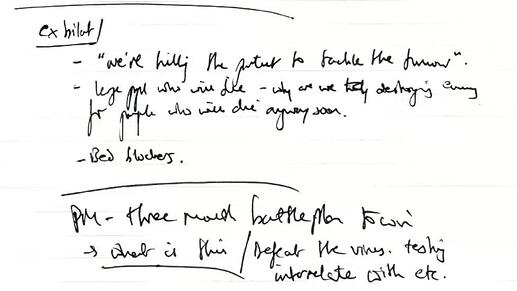The government’s Eat Out to Help Out scheme had been running that summer of 2020. At the time, there was fierce debate about the need for social-distancing measures to control the virus.
On Sunday 20 September 2020, then Prime Minister Boris Johnson called a Zoom meeting of scientists to discuss the government’s response to sharply rising Covid infections.
Dame Angela, then chief scientific adviser to the Ministry of Defence, who co-chaired the influential SPI-M modelling group during the pandemic, was one of the attendees, along with her colleague Prof John Edmunds, from the London School of Hygiene and Tropical Medicine (LSHTM).
Then Chancellor Rishi Sunak also dialled in, along with senior Downing Street officials including Dominic Cummings, the government’s chief medical adviser, Prof Chris Whitty, and the then chief scientific adviser, Sir Patrick Vallance.
And on Thursday, the Covid inquiry was shown a private WhatsApp exchange between Dame Angela and Prof Edmunds, sent at the time of the meeting, which refers to Rishi Sunak as "Dr Death, the Chancellor".
Prof Edmunds told the inquiry he was unable recall if that had been a specific reference to the Eat Out to Help Out scheme, which had subsidised food in pubs, restaurants and other hospitality venues over the summer, while Covid cases had been low.
But in earlier testimony to the inquiry, he said he was “still angry” about the policy. “It was one thing to take your foot off the brake - but another to put your foot on the accelerator,” he told the inquiry.
Prof Edmunds told the inquiry 45,000 people had just died - and while the pub and restaurant sector needed support, the government could have just given them money.
“This was a scheme to encourage people to take an epidemiological risk,” he added.
The Downing Street meeting had also involved scientists from what Sir Patrick described in an email as the “let it rip” brigade. That included Carl Heneghan, a professor of evidence-based medicine at Oxford University, and his colleague Prof Sunetra Gupta - both of whom were critics of several lockdown-related measures.
And in her WhatsApp exchange, Dame Angela uses an expletive to refer to an individual - thought to be Prof Heneghan - and his evidence, to which Prof Edmunds replies: “Every statistic is wrong.”
Well, whatever Dame Angela said, I’m sure that it suited the individual and I’m delighted that she so harshly judged the incompetent yet deadly Sunak … ![]()



